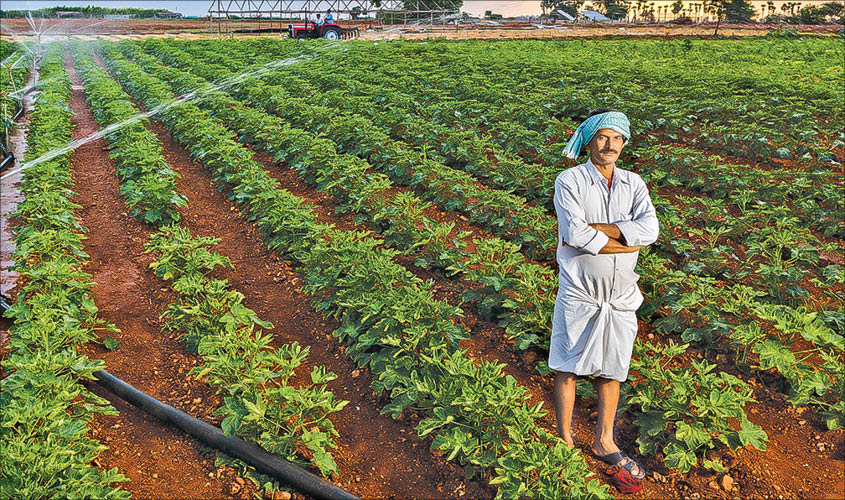Godfrey Phillips India’s award-winning CSR programme is aimed at setting up a social welfare safety net for the marginalised community of tobacco farmers in Vinukonda, Andhra Pradesh.
The tobacco industry in India is highly regulated and restricted. With various legislations and initiatives for tobacco control, the majorly impacted stakeholders are the marginalised farmers and workers associated with the industry. A strategic CSR programme by Godfrey Phillips India, called “Farmers Development and Women’s Welfare Program”, was started in the year 2013. It focuses on sustainable development and livelihood for communities associated with the sector. The programme caters to the needs of the burley tobacco farmers’ community in Vinukonda, Andhra Pradesh.
The marginalised burley tobacco farmers, with land holdings between 1-5 acres, continue to struggle because of droughts and lack of water for irrigation, limiting them to only grow a single crop annually. Given this situation, farmers are caught in the trap of low acreage, seasonal employment, meagre incomes, lower bargaining power, increasing debts and a downward trend in labour prices. Along with these issues, there are larger community issues arising from droughts, such as low access to safe and potable water, high fluoride contamination in groundwater, poor access to toilets, lack of community sanitation and hygiene, limited access to education and skills beyond farming. With the non-availability of social protection, the children of farmers and labourers inadvertently get pushed into child labour.
The CSR programmes of Godfrey Phillips India are designed with the objective of creating a safety network for the marginalised farmers, and incorporates initiatives to improve their earning capacity. These initiatives include exposure to good agricultural practices; collectivisation of farmers/workers into Farmers Development Societies/SHGs with seed fund to provide low-cost credit; water and soil conservation through desiltations, farm ponds and water sheds. The project also endeavours to work towards providing safe drinking water to farmers through community water plants, giving them access to toilets, setting up solar power sources, and campaigning for child education and against child labour. The “After School Programme” provides school infrastructure (toilets, playground, ROs, resources for fencing, painting and repair), and assists children with their studies, as well as with extracurriculars like yoga, sports, dance etc. Children also get nutritious snacks under this programme, which, at present, covers over 65 villages.

While the application of these programmes came with its own set of challenges, the biggest problem the organisers face are with the behavioural aspects of locals. To make the villagers understand that sanitation, health and hygiene, along with education and awareness, are interlinked with economic development is quite difficult. In spite of the need professed, toilets are not high on the list of priorities. Health and hygiene, especially of women, is neglected. WASH (UNICEF’s water, sanitation and hygiene project) has been operational here for more than four years now. However, open urination and defecation, mostly by men, are still common practices. Constant efforts are being made to bring about behavioural changes through workshops, village meetings and health camps. Regular surveys and impact assessments are held to ensure reduction of gap in the programme objectives and their realisation.
To ensure successful implementation of the programme, there is an intensive monitoring system (through online application) in place, with defined timeframes, tasks and responsibilities, physical monitoring at various levels from both the implementing agency and management through quarterly and annual reporting. Each update is documented and regular impact studies are conducted. As the community and beneficiaries are directly associated with the industry, the impact of the programme has been positive and at a faster rate. Moreover, all activities under the project have community involvement and contribution. Stakeholder meetings are held regularly (meetings for the panchayat, for farmers, for women etc.) to understand the needs, as well as gauge the requirement, initiative and involvement.
There are clear indications that mark the willingness of the community to associate with the programme. These are: low conflict between farmers and labourers; zero cases of child labour as per last year’s report; higher quality and volume of tobacco produce; and increased awareness of best practices in agricultural endeavours among others. Today, the farmers are receptive to the bigger picture. They not only contribute and participate, but have started to take the initiative. They are coming together as a community to recommend activities, share knowledge with other communities on their successful practices, push the government bodies for activities that have not been undertaken on time.
The programme, with over 200,000 direct and indirect beneficiaries, has been recognised by the office of District Magistrate, Andhra Pradesh Government, through awards like Greentech Foundation CSR Gold Award 2019, CSR Leadership Award 2019 and 8th Asia’s Best CSR Practices Award 2018. The awards recognise the impact of the company’s CSR initiatives in changing the lives of the underprivileged, poor farmers of the Guntur district in Andhra Pradesh.
For more information, download the CSR Report at www.godfreyphillips.com
The author is head of CSR, Godfrey Phillips India

